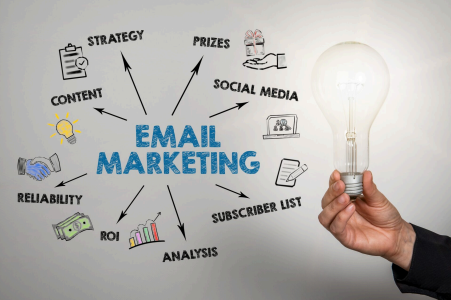Email marketing involves sending commercial messages to a group of people via email. These messages could range from promotional offers and product updates to newsletters and personalized recommendations. The primary goal is to engage subscribers, encourage action, and drive conversions. Unlike other marketing channels, email marketing allows for direct communication with your audience, enabling you to tailor messages based on their preferences and behaviors.
How Email Marketing Works for Small Businesses
For small businesses, email marketing serves as a powerful tool to establish and nurture relationships with customers. Here’s how it can benefit your business:
Building a Subscriber List: The first step in email marketing is building a quality subscriber list. Small businesses can collect email addresses through website sign-up forms, social media campaigns, and in-store promotions.
Offering incentives like discounts or freebies can entice visitors to subscribe to your emails.
Segmentation and Personalization: One of the strengths of email marketing is its ability to segment your audience based on demographics, interests, or purchase history. By sending targeted and personalized content, you can improve engagement and conversion rates. For instance, you can send different promotions to new subscribers versus loyal customers. Engaging Content Creation: Content is king in email marketing. Small businesses can use emails to share valuable content such as blog posts, product guides, or exclusive offers. Including visually appealing images and compelling copy can grab subscribers’ attention and encourage them to take action.
Automation and Workflow: Email marketing software offers automation features that allow small businesses to streamline their marketing efforts. You can set up automated workflows for welcome emails, abandoned cart reminders, or re-engagement campaigns. Automation saves time and ensures timely communication with your audience.
Measuring and Optimizing Performance: Email marketing platforms provide insights into key metrics like open rates, click-through rates, and conversion rates. Small businesses can use this data to track the effectiveness of their
campaigns and make adjustments accordingly. A/B testing subject lines, call-to-action buttons, and email designs can help optimize performance over time.
Essential Email Marketing Tools and Services
To execute a successful Email marketing strategy, small businesses rely on various tools and services tailored to their needs. Here are some essential ones:
Email Marketing Services: Platforms like Mailchimp, Constant Contact, and Sendinblue offer user-friendly interfaces and customizable templates for creating and sending emails. These services also provide list management, segmentation, and analytics features to help small businesses manage their campaigns effectively.
Marketing Automation Software: Tools like HubSpot, ActiveCampaign, and Drip enable small businesses to automate repetitive tasks and personalize customer interactions. From automated email sequences to lead scoring and CRM integration, marketing automation software streamlines the entire marketing process.
Email List Building Plugins: For businesses with WordPress websites, plugins like OptinMonster or Sumo are invaluable for capturing email addresses and
growing your subscriber list. These plugins offer customizable opt-in forms, exit-intent pop-ups, and A/B testing capabilities to maximize conversions. CRM Integration: Integrating your email marketing software with a customer relationship management (CRM) system like Salesforce or Zoho CRM allows for seamless data synchronization. This integration enables small businesses to track customer interactions across multiple channels and create targeted email campaigns based on customer behavior.
Analytics and Reporting Tools: Services such as Google Analytics and Adobe Analytics provide in-depth insights into website traffic, conversion funnels, and user behavior. By analyzing email campaign performance alongside other marketing efforts, small businesses can gain a comprehensive understanding of their audience and make data-driven decisions.
Email marketing remains a fundamental strategy for small businesses looking to engage customers, drive sales, and foster brand loyalty. By leveraging the right tools and services, small businesses can create targeted campaigns, automate processes, and measure results effectively. Whether you’re just starting or looking to refine your existing email marketing strategy, investing in email marketing services and software can yield significant returns for your business.
